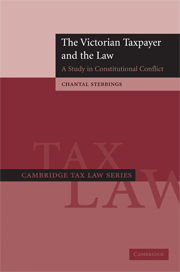Book contents
- Frontmatter
- Contents
- Acknowledgements
- Table of Statutes
- Table of Cases
- List of Abbreviations
- 1 The establishment of the taxpayer's safeguards in English law
- 2 The taxpayer's constitutional safeguards of Parliament
- 3 The administrative safeguard of localism
- 4 Judicial safeguards
- 5 The taxpayer's access to the safeguards
- 6 The taxpayer, the constitution and consent
- Index
3 - The administrative safeguard of localism
Published online by Cambridge University Press: 08 August 2009
- Frontmatter
- Contents
- Acknowledgements
- Table of Statutes
- Table of Cases
- List of Abbreviations
- 1 The establishment of the taxpayer's safeguards in English law
- 2 The taxpayer's constitutional safeguards of Parliament
- 3 The administrative safeguard of localism
- 4 Judicial safeguards
- 5 The taxpayer's access to the safeguards
- 6 The taxpayer, the constitution and consent
- Index
Summary
Introduction
When Sir Robert Peel's second administration was formed in 1841, the established system of tax administration for all the direct taxes was one of localism. Local commissioners made the assessments on the basis of information gathered by their own assessors and collected the tax through their own collectors. It was regarded as of great importance that they be assessed and collected by commissioners who were the representatives of the taxpayers, persons unconnected with and totally independent of central government and so free from its control or influence, and who were furthermore of sufficient personal wealth as not to be open to temptation. Their status held the balance evenly between the state and the taxpayer ensuring, in theory, that the former received and the latter paid no more and no less than each was bound to do by law. Quite apart from the protection which taxpayers derived from the localism inherent in the administrative system, the power they were given to appeal to independent adjudicating commissioners if they were aggrieved by a decision within the assessment process constituted a distinct safeguard. Politicians and civil servants knew that some form of appeal was necessary and it was almost invariably the sole overt formal safeguard against arbitrary fiscal action expressed in the legislation. All parties involved in tax law and practice saw it as the most important and prominent of all the legal safeguards.
- Type
- Chapter
- Information
- The Victorian Taxpayer and the LawA Study in Constitutional Conflict, pp. 77 - 110Publisher: Cambridge University PressPrint publication year: 2009



